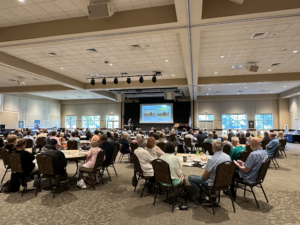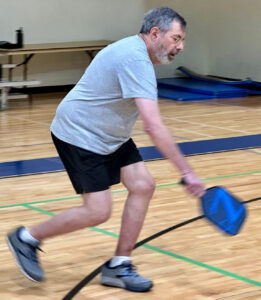Recent Developments in Parkinson’s Disease Treatment and Awareness
By Kate Fiorianti | April 7, 2025 Over the past five years, significant advancements have transformed the landscape of Parkinson’s disease diagnosis and treatment. As we observe Parkinson’s Awareness Month this April, it’s essential to highlight these developments that offer hope and improved quality of life for those affected by the disease. Enhanced Diagnostic Techniques Early and […]
Eating Right with Parkinson’s: Nutrition Month Tips

By Kate Fiorianti | March 6, 2025 March is National Nutrition Month—a perfect time to focus on how food can support those living with Parkinson’s Disease. While there is no specific “Parkinson’s diet,” certain foods may help manage symptoms, improve overall health, and enhance quality of life. A well-balanced diet rich in nutrients can help support brain […]
Valentine’s Day and Parkinson’s: Nurturing Relationships

By Kate Fiorianti | February 4, 2025 Valentine’s Day is a time to celebrate love and connection, but for those managing Parkinson’s disease, it can bring unique challenges. Parkinson’s affects not just the individual but also their relationships. However, with intentional effort, nurturing emotional and romantic connections is both possible and deeply rewarding. Here are some ideas […]
New Year, New Strategies: Setting Goals for Living Well with Parkinson’s in 2025

By Kate Fiorianti | January 6, 2025 As the calendar turns to 2025, it’s a perfect opportunity to reflect, reset, and refocus. For those living with Parkinson’s—as well as the care partners and family members who support them—the new year offers a chance to set meaningful goals that prioritize health, wellness, and quality of life. Goal-setting can […]
Shaping the Future of the Peterson Foundation for Parkinson’s

By Kate Fiorianti | January 3, 2025 A Message from Our New Executive Director, Amy Breedlove As I step into the role of Executive Director for the Peterson Foundation for Parkinson’s, I am filled with both excitement and a profound sense of purpose. The opportunity to lead this organization is inspired by my deep admiration for the […]
The Peterson Foundation for Parkinson’s Announces Leadership Transition: Debbie Lowenthal Retires, Amy Breedlove Steps Into Role

By Kate Fiorianti | January 3, 2025 Nashville, TN — January 3, 2025 — Peterson for Parkinson’s recently announced the retirement of its Executive Director, Debbie Lowethal, effective December 31, 2024. After 15, Debbie leaves behind a legacy within the Middle Tennessee Parkinson’s Community. “While working with Brent and Tami, I witnessed their dedication to supporting Parkinson’s […]
Caring for the Caregiver: Recognizing and Addressing Burnout in Parkinson’s Care Partners

By Kate Fiorianti | November 21, 2024 Being a care partner for someone living with Parkinson’s disease is an act of love and dedication. From managing daily routines to navigating medical appointments and emotional support, the role requires tremendous time, energy, and resilience. However, amidst focusing on your loved one’s needs, it’s easy to lose sight of […]
2024 Navigating the Parkinson’s Path: Insights and Information on Improved Living

By Kate Fiorianti | August 16, 2024 The 2024 Navigating the Parkinson’s Path was a resounding success, bringing together experts, sponsors, and the community to explore groundbreaking advancements in Parkinson’s disease treatment and management. On Saturday, August 10 the Peterson Foundation for Parkinson’s welcomed over 180 members of the Middle Tennessee Parkinson’s Community to network and gain […]
Understanding and Managing Cognitive Health in Parkinson’s Disease

By Kate Fiorianti | June 11, 2024 When it comes to Parkinson’s Disease (PD), understanding and managing cognitive health is crucial for maintaining quality of life. During our recent Empowering Minds: Parkinson’s Mental Wellness for Patients, Families and Caregivers, Dr. Kaltra Dhima from Vanderbilt Medical Center, alongside MyLiveability Occupational Therapists Dr. Carlene Johnson OTD/OTR/L and Tori Vik […]
Unleashing the Power of Pickleball for those with Parkinson’s

By Kate Fiorianti | March 6, 2024 Pickleball, a sport that combines elements of tennis, badminton, and ping-pong, has gained recognition for its numerous benefits, particularly for individuals dealing with Parkinson’s disease. Several advantages of the sport include: Read on to learn about the creation of Pickleball Friday’s at the JCC. Peter Obermeyer, Nashville Parkinson’s Support Group […]

